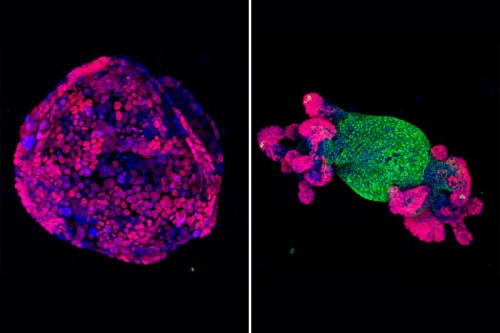Anti-cancer strategies usually involve killing cancer cells. It turns out that there is another possibility, to turn the cells into normal cells of the tissue through the reactivation of a single gene. Researchers found that normal levels of a human colon cancer gene in mice stopped tumor growth and normal bowel function returned in just four days.

Anti-cancer strategies usually involve killing cancer cells. It turns out that there is another possibility, to turn the cells into normal cells of the tissue through the reactivation of a single gene. This is according to a study published on June 18 in the journal Cell. Researchers found that normal levels of the gene stopped tumor growth. Normal bowel function returned after four days, the tumors disappeared within two weeks and the signs of cancer disappeared a few months later. The findings provide proof of principle that restoring the function of a single tumor suppressor gene can cause tumor regression and offer future avenues for developing effective anti-cancer treatments.
Colorectal cancer is the second most common cause of death among cancers in developed countries. About 700,000 deaths of people who have colon cancer are recorded worldwide each year. "Treatment regimens for advanced-stage colon cancer involving chemotherapy - a combination of toxic and mostly ineffective agents - are still the main treatment in the last decade," says Scott Leva, from the Memorial Sloan Kettering Hospital Cancer Center.
Nearly 90% of the cancer cells in colon tumors contain mutations that turn off a tumor suppressor gene called (adenomatous polyposis coli APC), although these mutations were considered to be involved in the formation of the tumor, but it was not clear whether APC also plays a role in tumor growth and survival after the cancer has already developed.
"We wanted to know if correcting the APC disruption in advanced cancer cells would be sufficient to stop tumor growth and cause regression," says lead author Lucas Dow of Cornell University's Weill School of Medicine. The concern is that attempts to restore the function of lost or mutated genes in cancer cells can often result in excess gene activity and this causes other problems in normal cells.
To overcome this challenge, Lau and his team used a precise genetic technique to reverse disruption of APC activity in a mouse model of colon cancer. While the vast majority of animal models developed the tumors primarily in the small intestine, the new animal model also developed tumors in the colon, similar to human patients.
These findings are consistent with previous findings, according to which APC suppression in the animals activates the Wnt signaling pathway, which is known to control cell proliferation, migration and survival.
When APC was restored, Wnt signaling returned to normal levels, cancer cells stopped proliferating, and intestinal cells recovered and returned to normal function. Tumors shrank and disappeared or became normal tissue within two weeks, and there were no signs of cancer recurrence during a six-month follow-up period. Furthermore, this approach was effective in treating mice with malignant colon cancer tumors containing mutations of the p53 gene, which are found in half of human patients.
Although the APC gene rearrangement is unlikely to be relevant to other types of cancer, the general experimental approach could have far-reaching implications. "The idea of identifying mutations that control a specific tumor is a main focus of many laboratories around the world," says Dow. "If we can define what types of mutations and changes control tumor growth and we will have better tools to find the most appropriate treatments for an individual cancer."
In the next step, the researchers will ask to examine the consequences of the reactivation of APC in colon cancer tumors that have already developed metastases in the hope of mimicking this effect with drug treatments.
"It is currently impractical to directly restore APC function in patients with colon cancer, and recent evidence shows that complete blockade of Wnt signaling may create a toxic environment for normal intestinal cells," says Lau. "However, our findings suggest that small molecules that allow regulation without blocking the Wnt pathway could achieve effects similar to APC reactivation. Of course, further work is required to determine whether Wnt inhibition or similar approaches will provide long-term therapeutic value."
